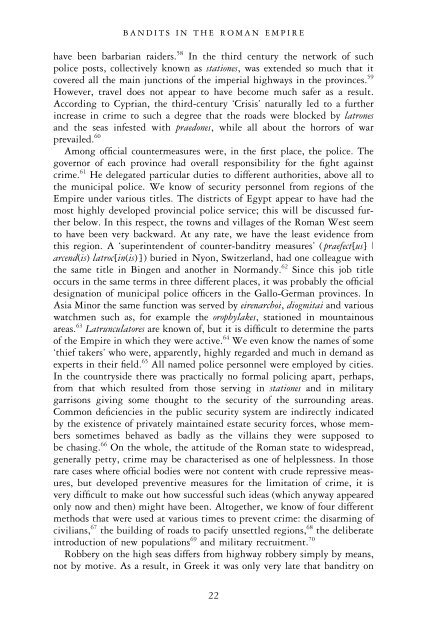You also want an ePaper? Increase the reach of your titles
YUMPU automatically turns print PDFs into web optimized ePapers that Google loves.
BANDITS IN THE ROMAN EMPIRE<br />
have been barbarian raiders. 58 In the third century the network of such<br />
police posts, collectively known as stationes, was extended so much that it<br />
covered all the main junctions of the imperial highways in the provinces. 59<br />
However, travel does not appear to have become much safer as a result.<br />
According to Cyprian, the third-century ‘Crisis’ naturally led to a further<br />
increase in crime to such a degree that the roads were blocked by <strong>latrones</strong><br />
and the seas infested with praedones, while all about the horrors of war<br />
prevailed. 60<br />
Among official countermeasures were, in the first place, the police. The<br />
governor of each province had overall responsibility for the fight against<br />
crime. 61 He delegated particular duties to different authorities, above all to<br />
the municipal police. We know of security personnel from regions of the<br />
Empire under various titles. The districts of Egypt appear to have had the<br />
most highly developed provincial police service; this will be discussed further<br />
below. In this respect, the towns and villages of the Roman West seem<br />
to have been very backward. At any rate, we have the least evidence from<br />
this region. A ‘superintendent of counter-banditry measures’ ( praefect[us] |<br />
arcend(is) latroc[in(is)]) buried in Nyon, Switzerland, had one colleague with<br />
the same title in Bingen and another in Normandy. 62 Since this job title<br />
occurs in the same terms in three different places, it was probably the official<br />
designation of municipal police officers in the Gallo-German provinces. In<br />
Asia Minor the same function was served by eirenarchoi, diogmitai and various<br />
watchmen such as, for example the orophylakes, stationed in mountainous<br />
areas. 63 Latrunculatores are known of, but it is difficult to determine the parts<br />
of the Empire in which they were active. 64 We even know the names of some<br />
‘thief takers’ who were, apparently, highly regarded and much in demand as<br />
experts in their field. 65 All named police personnel were employed by cities.<br />
In the countryside there was practically no formal policing apart, perhaps,<br />
from that which resulted from those serving in stationes and in military<br />
garrisons giving some thought to the security of the surrounding areas.<br />
Common deficiencies in the public security system are indirectly indicated<br />
by the existence of privately maintained estate security forces, whose members<br />
sometimes behaved as badly as the villains they were supposed to<br />
be chasing. 66 On the whole, the attitude of the Roman state to widespread,<br />
generally petty, crime may be characterised as one of helplessness. In those<br />
rare cases where official bodies were not content with crude repressive measures,<br />
but developed preventive measures for the limitation of crime, it is<br />
very difficult to make out how successful such ideas (which anyway appeared<br />
only now and then) might have been. Altogether, we know of four different<br />
methods that were used at various times to prevent crime: the disarming of<br />
civilians, 67 the building of roads to pacify unsettled regions, 68 the deliberate<br />
introduction of new populations 69 and military recruitment. 70<br />
Robbery on the high seas differs from highway robbery simply by means,<br />
not by motive. As a result, in Greek it was only very late that banditry on<br />
22


